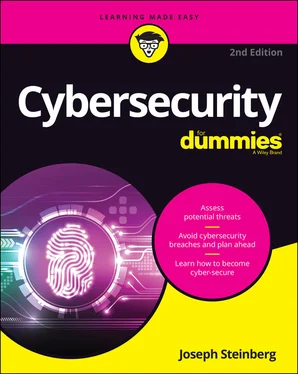Joseph Steinberg - Cybersecurity For Dummies
Здесь есть возможность читать онлайн «Joseph Steinberg - Cybersecurity For Dummies» — ознакомительный отрывок электронной книги совершенно бесплатно, а после прочтения отрывка купить полную версию. В некоторых случаях можно слушать аудио, скачать через торрент в формате fb2 и присутствует краткое содержание. Жанр: unrecognised, на английском языке. Описание произведения, (предисловие) а так же отзывы посетителей доступны на портале библиотеки ЛибКат.
- Название:Cybersecurity For Dummies
- Автор:
- Жанр:
- Год:неизвестен
- ISBN:нет данных
- Рейтинг книги:3 / 5. Голосов: 1
-
Избранное:Добавить в избранное
- Отзывы:
-
Ваша оценка:
- 60
- 1
- 2
- 3
- 4
- 5
Cybersecurity For Dummies: краткое содержание, описание и аннотация
Предлагаем к чтению аннотацию, описание, краткое содержание или предисловие (зависит от того, что написал сам автор книги «Cybersecurity For Dummies»). Если вы не нашли необходимую информацию о книге — напишите в комментариях, мы постараемся отыскать её.
Cybersecurity For Dummies
Cybersecurity For Dummies
Cybersecurity For Dummies — читать онлайн ознакомительный отрывок
Ниже представлен текст книги, разбитый по страницам. Система сохранения места последней прочитанной страницы, позволяет с удобством читать онлайн бесплатно книгу «Cybersecurity For Dummies», без необходимости каждый раз заново искать на чём Вы остановились. Поставьте закладку, и сможете в любой момент перейти на страницу, на которой закончили чтение.
Интервал:
Закладка:
A strategy of storing backups on hard drives at two different sites may be a poor strategy, for example, if both sites consist of basements located in homes within flood zones.
Pandemics
One particular form of natural disaster is a pandemic or other medical issue. As people around the world saw clearly in 2020, the arrival of a highly contagious disease can cause a sudden shutdown of many in-person working facilities and schools, and cause a sudden migration to online platforms — creating all sorts of cybersecurity-related issues.
Man-made environmental problems
Of course, nature is not the only party creating external problems. Humans can cause floods and fires, and man-made disasters can sometimes be worse than those that occur naturally. Furthermore, power outages and power spikes, protests and riots, strikes, terrorist attacks, and Internet failures and telecom disruptions can also impact the availability of data and systems.
Businesses that backed up their data from systems located in New York’s World Trade Center to systems in the nearby World Financial Center learned the hard way after 9/11 the importance of keeping backups outside the vicinity of the corresponding systems, as the World Financial Center remained inaccessible for quite some time after the World Trade Center was destroyed.
Cyberwarriors and cyberspies
Modern-day governments often have tremendous armies of cyberwarriors at their disposal. Such teams often attempt to discover vulnerabilities in software products and systems to use them to attack and spy on adversaries, as well as to use as a law enforcement tool. Doing so, however, creates risks for individuals and businesses. Instead of reporting vulnerabilities to the relevant vendors, various government agencies often seek to keep the vulnerabilities secret — meaning that they leave their citizens, enterprises, and other government entities vulnerable to attack by adversaries who may discover the same vulnerability.
In addition, governments may use their teams of hackers to help fight crime — or, in some cases, abuse their cyber-resources to retain control over their citizens and preserve the ruling party’s hold on power. Even in the United States, in the aftermath of 9/11, the government implemented various programs of mass data collection that impacted law-abiding U.S. citizens. If any of the databases that were assembled had been pilfered by foreign powers, U.S. citizens may have been put at risk of all sorts of cyberproblems.
The dangers of governments creating troves of data exploits are not theoretical. In recent years, several powerful cyberweapons believed to have been created by a U.S. government intelligence agency surfaced online, clearly having been stolen by someone whose interests were not aligned with those of the agency. To this day, it remains unclear whether those weapons were used against American interests by whoever stole them.
The impotent Fair Credit Reporting Act
Many Americans are familiar with the Fair Credit Reporting Act (FCRA), a set of laws initially passed nearly half a century ago and updated on multiple occasions. The FCRA regulates the collection and management of credit reports and the data used therein. The FCRA was established to ensure that people are treated fairly, and that credit-related information remains both accurate and private.
According to the Fair Credit Reporting Act, credit reporting bureaus must remove various forms of adverse information from people's credit reports after specific time frames elapse. If you don't pay a credit card bill on time while you’re in college, for example, it’s against the law for the late payment to be listed on your report and factored against you into your credit score when you apply for a mortgage two decades later. The law even allows people who declare bankruptcy in order to start over to have records of their bankruptcy removed. After all, what good would starting over be if a bankruptcy forever prevented someone from having a clean slate?
Today, however, various technology companies undermine the protections of the FCRA. How hard is it for a bank's loan officer to find online databases of court filings related to bankruptcies by doing a simple Google search and then looking into such databases for information relevant to a prospective borrower? Or to see whether any foreclosure records from any time are associated with a name matching that of someone seeking a loan? Doing either takes just seconds, and no laws prohibit such databases from including records old enough to be gone from credit reports, and, at least in the United States, none prohibit Google from showing links to such databases when someone searches on the name of someone involved with such activities decades earlier.
Expunged records are no longer really expunged
The justice system has various laws that, in many cases, allow young people to keep minor offenses off of their permanent criminal records. Likewise, our laws afford judges the ability to seal certain files and to expunge other forms of information from people’s records. Such laws help people start over; it is not a secret that many wonderful, productive members of modern society may not have turned out as they did without these protections.
But what good are such laws if a prospective employer can find the supposedly purged information within seconds by doing a Google search on a candidate’s name? Google returns results from local police blotters and court logs published in local newspapers that are now archived online. People who were cited for minor offenses and then had all the charges against them dropped can still suffer professional and personal repercussions decades later — even though they were never indicted, tried, or found guilty of any offense.
Social Security numbers
A generation ago, it was common to use Social Security numbers as college ID numbers. The world was so different back then that for privacy reasons, many schools even posted people's grades using Social Security numbers rather than using students’ names! Yes, seriously.
Should all students who went to college in the 1970s, 1980s, or early 1990s really have their Social Security numbers exposed to the public because college materials that were created in the pre-web world have now been archived online and are indexed in some search engines? To make matters worse, some parties authenticate users by asking for the last four digits of people’s phone numbers, which can often be found in a fraction of a second via a cleverly crafted Google or Bing search. If it is common knowledge that such information has been rendered insecure by previously acceptable behaviors, why does the government still utilize Social Security numbers and treat them as if they were still private?
Likewise, online archives of church, synagogue, and other community newsletters often contain birth announcements listing not only the name of the baby and the baby’s parents, but the hospital in which the child was born, the date of birth, and the grandparents’ names. How many security questions for a particular user of a computer system can be undermined by a crook finding just one such announcement? All of these examples show how advances in technology can undermine our privacy and cybersecurity — even legally undermining laws that have been established to protect us.
Social media platforms
One group of technology businesses that generate serious risks to cybersecurity are social media platforms. Cybercriminals increasingly scan social media — sometimes with automated tools — to find information that they can use against companies and their employees. Attackers then leverage the information that they find to craft all sorts of attacks, such as one involving the delivery of ransomware. For example, they may craft highly effective spear-phishing emails credible enough to trick employees into clicking on URLs to ransomware-delivering websites or into opening ransomware-infected attachments.
Читать дальшеИнтервал:
Закладка:
Похожие книги на «Cybersecurity For Dummies»
Представляем Вашему вниманию похожие книги на «Cybersecurity For Dummies» списком для выбора. Мы отобрали схожую по названию и смыслу литературу в надежде предоставить читателям больше вариантов отыскать новые, интересные, ещё непрочитанные произведения.
Обсуждение, отзывы о книге «Cybersecurity For Dummies» и просто собственные мнения читателей. Оставьте ваши комментарии, напишите, что Вы думаете о произведении, его смысле или главных героях. Укажите что конкретно понравилось, а что нет, и почему Вы так считаете.












